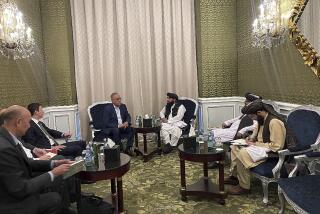Mugabe spurs anger at hunger summit
ROME — So what’s wrong with a man accused of starving his people attending a global summit on world hunger?
Plenty, say several of the leaders who find themselves joining Zimbabwean President Robert Mugabe here for a three-day crisis meeting on the soaring prices of food.
“It is obscene,” said Douglas Alexander, Britain’s international development secretary and the head of its delegation. Alexander told BBC radio Monday that he would refuse to acknowledge Mugabe, saying the president’s “profound misrule” condemned millions of Zimbabweans to dependence on food aid for survival.
Despite a European Union travel ban imposed on Mugabe more than five years ago, he flew into Rome on Sunday night and under police escort was whisked to a fancy hotel on the city’s Via Veneto, famed symbol of la dolce vita.
Officials of the United Nations Food and Agriculture Organization, or FAO, which is sponsoring the conference, said they could not block Mugabe’s attendance because EU restrictions do not extend to a U.N. venue. (Mugabe similarly wiggled around the travel ban with Italian acquiescence when he attended the funeral of Pope John Paul II in 2005. The ceremony took place in the Vatican, a city-state not part of the EU, even though Mugabe flew into Italy, which is a member.)
Approximately 40 heads of state or government are expected in Rome this week for the FAO summit, which is aimed at confronting the spread of world hunger amid sharp increases in food costs. Officials blame a daunting convergence of factors, from record prices for fuel to bad harvests exacerbated by climate change, for making food unavailable or unaffordable to a vast, globe-spanning community of already poor people.
Critics regard Mugabe’s presence as especially provocative because of what they see as his role in plunging his once bountiful nation into economic chaos. In what he portrayed as a reform program, Mugabe seized thousands of white-owned farms that he said would go to landless blacks but ended up, critics charge, in the hands of his cronies, who allowed them to waste away.
His arrival here followed arrests over the weekend of two prominent opposition figures in Zimbabwe, the latest in a bloody crackdown on opponents before and after March 29 elections that Mugabe lost to Morgan Tsvangirai, leader of the Movement for Democratic Change. But the margin of Tsvangirai’s victory was not sufficient to avoid a runoff, scheduled for June 27.
The U.S. State Department said the latest opposition arrests were “troubling and disturbing” and “part of a continuing pattern” of intimidation by Mugabe’s ruling party.
Australia and the Netherlands joined the chorus condemning Mugabe’s presence. “We will not allow the millions of people who can no longer afford a normal meal to be held hostage by Mugabe,” the head of the Dutch delegation, Development Minister Bert Koenders, said in a statement.
Another participant raising eyebrows is Iranian President Mahmoud Ahmadinejad, who before traveling to Rome reiterated his conviction that Israel will be wiped from the map.
Italian Prime Minister Silvio Berlusconi has chosen to exclude Mugabe and Ahmadinejad from a state dinner tonight honoring conference attendees, Italian news agencies reported. Berlusconi is co-hosting the dinner with U.N. Secretary-General Ban Ki-moon.
Several Italian groups are planning demonstrations to protest against both Mugabe and Ahmadinejad.
The Iranian president reportedly requested an audience with Pope Benedict XVI, but no such meeting figures on the pontiff’s schedule.
Ronald S. Lauder, president of the New York-based World Jewish Congress, said it was “deplorable” that Ahmadinejad might be allowed to “hijack the agenda” of a global conference.
The head of the U.S. delegation here for the summit, Agriculture Secretary Ed Schafer, said he would not be meeting with Mugabe or Ahmadinejad.
Speaking at a news conference in, as fate would have it, the Iran Room of FAO headquarters, Schafer was pressed by a journalist on whether it might not be a good idea to employ a bit of diplomacy and speak to the president of Iran.
Schafer responded: “No one from the [U.S.] delegation will meet with the country you mention.”
--
More to Read
Sign up for Essential California
The most important California stories and recommendations in your inbox every morning.
You may occasionally receive promotional content from the Los Angeles Times.











